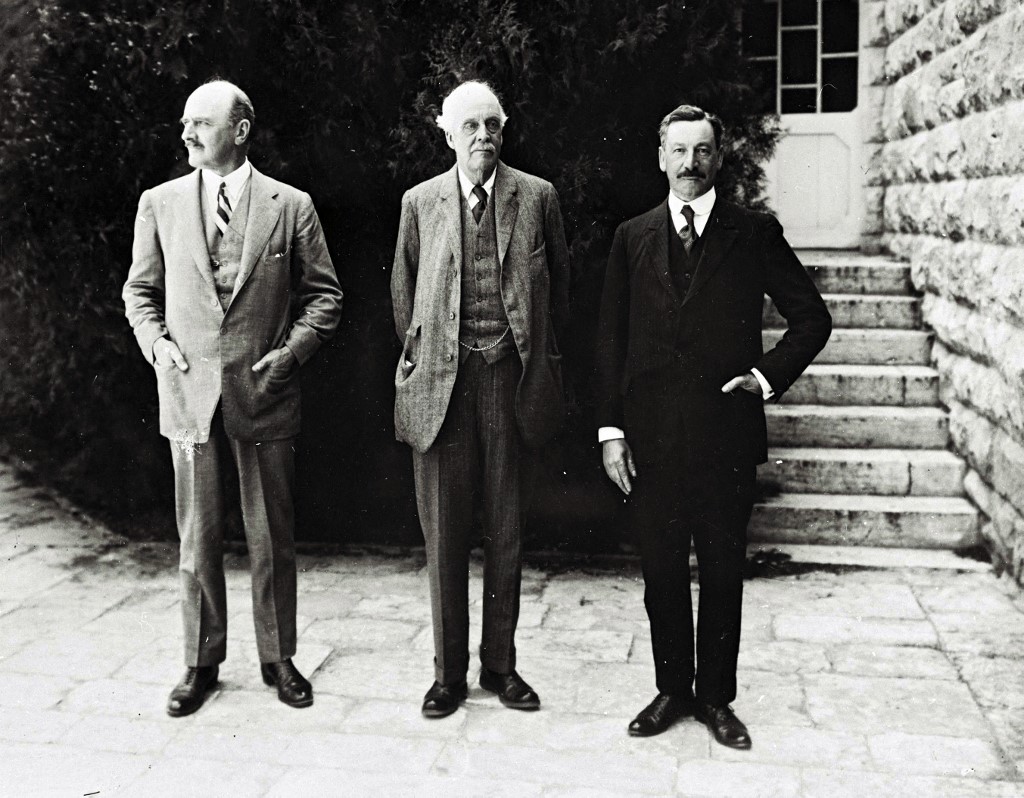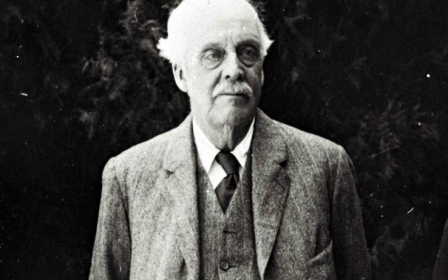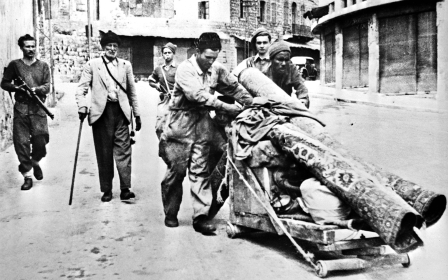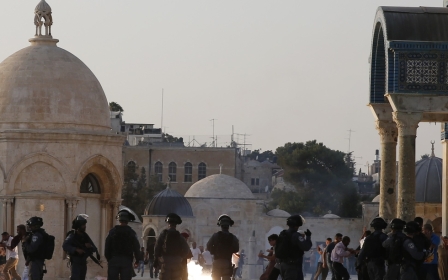Yes, Palestinians must get reparations from the British. But an apology is vital too

Palestinians and their supporters around the world mark 15 May as the anniversary of the 1948 Nakba (Catastrophe). However, the Palestinian catastrophe was set in motion in London's Foreign and Commonwealth Office on 2 November 1917, when the Balfour Declaration was issued.
In it, British Foreign Secretary Arthur Balfour promised the Zionist Federation that his government “viewed with favour the establishment in Palestine of a national home for the Jewish people and would use their best endeavours to facilitate the achievement of this object”.
Britain promised the land of the Palestinian people to another people who did not live there and had no right to it
There was, of course, more to this short document, but Britain, which was not in occupation of Palestine, promised the land of the Palestinian people to another people who did not live there and had no right to it.
Britain could also have offered Wales to the Jews.
One hundred and four years on, and Britain has still not accepted its responsibility for the part it played in the abuse of Palestinian people’s rights in the leadup to the British mandate, and its deliberate facilitation of the establishment of a state for another people in their homeland.
New MEE newsletter: Jerusalem Dispatch
Sign up to get the latest insights and analysis on Israel-Palestine, alongside Turkey Unpacked and other MEE newsletters
Let's pretend
When I first came to Britain in the 1970s from Saudi Arabia, I learned quite a few sayings. One of them was that "an Englishman’s home is his castle".
Clearly, the Zionist forces and the British occupiers did not apply the same sentiment to the Palestinians, as home after home was taken by Zionists and handed over to settlers. This continues to the day, as Israel regularly demolishes Palestinian houses for lack of building permits and expels others from their homes, the threatened expulsions in East Jerusalem's Sheikh Jarrah being just the latest example.
The other saying, or maybe it is just a game, is "let’s pretend".
Well, on 2 November 2021, let's pretend what might have happened had the Balfour Declaration not been issued. I will of course need to be creative here, but why not?
During the British and French mandates, there was no migration from outside the areas they ruled. When the mandate ended, the people of the land became independent, forming Jordan, Iraq, Syria and Lebanon.
If it was not for the mass migration into Palestine in the leadup to the end of the British mandate, Palestine would have been born for the Muslim, Christian and Jewish inhabitants. Jerusalem would have been the capital and the previously prosperous Palestine would have been a powerhouse as an independent nation, with its successful farming, trade and entrepreneurship.
A snapshot of what it looked like in 1920 can be seen in this Al Jazeera documentary. A quick search of the internet produces video after video and photograph after photograph of Palestine before 1948 and confirms its potential to be that powerhouse.
There would be no occupation
Had the Balfour Declaration not led to the creation of Israel, the neighbouring countries that became independent would have continued to develop as countries for Muslims, Christians and Jews. They and Palestine would have been far more peaceful nations and there would not have been the need for resistance groups in Palestine to counter the attempt to take more of their homes and lands.
The resources that the land of Palestine embraced - whether water, gas or other minerals - would have belonged to the Palestinians in their homeland. Instead, the settlers now control them and charge the indigenous Palestinians to use them.
Palestine would have been open as one land for the people living in it, not divided into a state, a zoned West Bank and a besieged Gaza. Palestinians could have moved around freely, worked and married in all its areas. There would not be roads for some but not for others. There would not be different colour permits. In simple terms, there would be no occupation. There would be no refugees.
It may have started with the Zionist movement targeting Palestine for their homeland, but Britain played a pivotal - and, from the viewpoint of the Palestinians, a shameful - role in what happened to them during the British mandate and since.
The resources the land of Palestine embraced would have belonged to the Palestinians in their homeland. Instead, the settlers now control them
Britain has failed to take responsibility for denying the Palestinians the future that other peoples who became independent at the end of its mandate achieved. It even had the temerity to celebrate the centenary of Balfour, with a special gala dinner that former Israeli Prime Minister Benjamin Netanyahu attended in London. Then-British Prime Minister Theresa May said that Britain was “proud of our pioneering role in the creation of the state of Israel”.
May went on to say: “But as we work together towards Balfour’s vision of a peaceful coexistence, we must be equally clear that there can never be any excuses for boycotts, divestment or sanctions: they are unacceptable and this government will have no truck with those who subscribe to them.”
Successive British governments have simply expressed concern about illegal settlement-building. But current UK Prime Minister Boris Johnson’s administration has promised to legislate to ban public bodies from holding to account companies complicit in human rights violations through divestment.
The Masri case
What should the Palestinians do to expose the role of Britain in their continuing Nakba?
In a recent column in Middle East Eye, Professor Joseph Massad argued that Palestinians deserved reparations for Britain’s colonial crimes. I agree with him. But he also referred to the case being brought by Palestinian billionaire Munib Masri to force an apology from Britain 104 years on.
Massad does not believe Masri’s case goes far enough. I take a different view. Sitting with a group of Palestinians Masri addressed on a recent visit to London, it was clear that there was unanimity that Palestinians would support his case and, with careful planning, could bring not only Palestinians around the world behind the case but also their supporters in Britain.
The case would provide an opportunity for Palestinians who, while still enjoying a high level of support in Britain, are aware of attempts by pro-Israel groups to silence them and their supporters.
Israel would like to claim that the conflict with the Palestinians started with the first attacks by Palestinian guerillas in the early 1970s following the 1967 war and occupation of East Jerusalem.
The Masri case would give Palestinians the opportunity to reclaim the narrative and at the same time remind Britons of the role their country played - and continues to play - in strengthening Israel and allowing the Palestinians to be sacrificed to ensure Israel’s security.
As Palestinians stand outside British embassies in 10 European countries on 2 November, a coordinated effort is needed to maximise the promotion of the benefits of the Masri case.
There is surely no need for a case to be brought to force Britain to issue an apology.
Boris Johnson, who described the Balfour Declaration as “an exquisite piece of Foreign Office fudgerama'', could surely find the sincerity and remorse to apologise for Britain’s role in the century-long suffering of the Palestinian people.
The views expressed in this article belong to the author and do not necessarily reflect the editorial policy of Middle East Eye.
Middle East Eye delivers independent and unrivalled coverage and analysis of the Middle East, North Africa and beyond. To learn more about republishing this content and the associated fees, please fill out this form. More about MEE can be found here.








